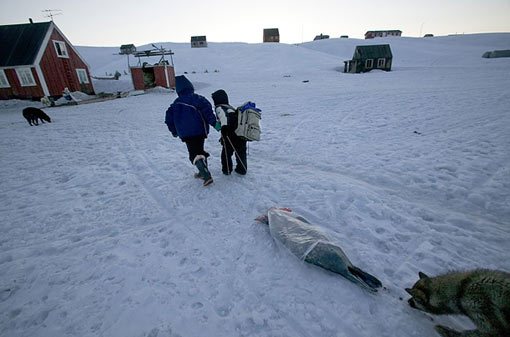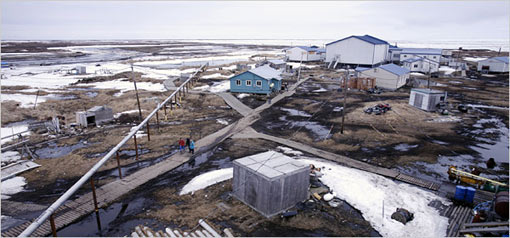You are hereWcP.System.Thinker's blog
WcP.System.Thinker's blog
Arctic blizzards, UK. Freezing snow turns cars, bridges, trees into ice statues. Warm ocean currents 30% less
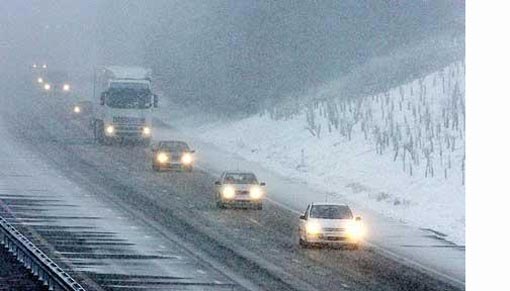
(quote)
Snow and freezing weather threaten to shut down Britain
Arctic blizzards are set to cause a national shutdown on Monday as forecasters warn of the most widespread snowfall for almost 20 years.
The Met Office is warning of an "extreme weather event" across large swathes of England, Scotland and Wales with up to 10in of snow expected even in the usually warmer south and as much as 1ft on higher ground. With freezing temperatures expected to endure for at least a week, there were predictions that resulting disruption and an expected spike in absenteeism could cost the British economy as much as £600 million a day, as the public transport system grinds to a halt and schools and offices are forced to close.

New weather warning after storms kill 21 in France and Spain
As hundreds of thousands are left without power, forecasters fear floods will follow worst weather for a decade
With 680,000 people still without electricity in France and 50,000 in Spain... read more »
Antarctica: Larsen B ice shelf, a large floating ice mass shattered, separated: AVHRRadiometer deployed on satellites since 1981
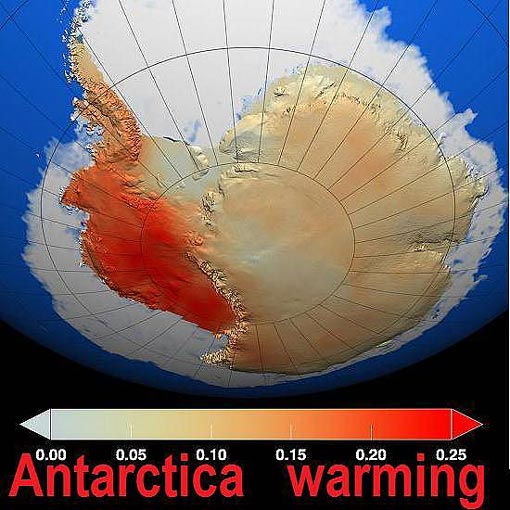
(quote)
The Antarctic Peninsula juts into the Southern Ocean, reaching farther north than any other part of the continent. The southernmost reach of global warming was believed to be limited to this narrow strip of land, while the rest of the continent was presumed to be cooling or stable.
Not so, according to a new analysis involving NASA data. In fact, the study has confirmed a trend suspected by some climate scientists. "Everyone knows it has been warming on the Antarctic Peninsula, where there are lots of weather stations collecting data," said Eric Steig, a climate researcher at the University of Washington in Seattle, and lead author of the study. "Our analysis told us that it is also warming in West Antarctica."
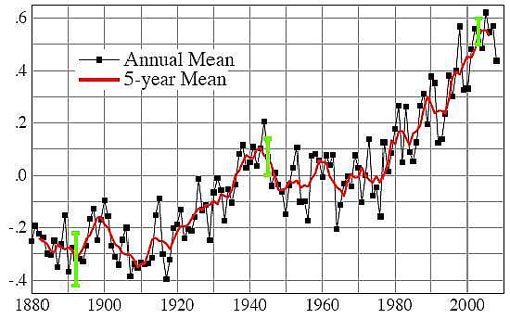
The finding is the result of a novel combination of historical temperature data from ground-based weather stations and more recent data from satellites. Steig and colleagues used data from each record to fill in gaps in the other and to reconstruct a 50-year history of surface temperatures across Antarctica. read more »
Solar system moving 100000 mph faster than thought; 15% speed increase translates to doubling of mass of Milky Way
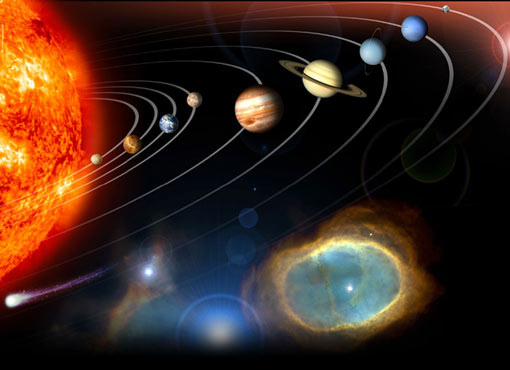
(quote)
It turns out that our solar system is moving nearly 100,000 m.p.h. faster than previously thought — revolving around the center of the Milky Way at 568,000 m.p.h., announced Mark Reid of the Harvard-Smithsonian Center for Astrophysics on Monday at the American Astronomical Society's conference in Long Beach, Calif. Since velocity is related to mass, the 15% increase in solar-system speed translates into a near doubling of mass of the Milky Way, according to Reid's group — and all of that newfound bulk is composed of dark matter.
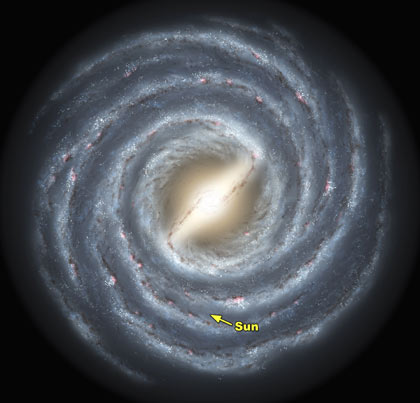
Original estimates of the solar system's speed were based on what Reid calls "one- dimensional velocity" obtained solely from Doppler shifts. "Now," he says, "we have three-dimensional velocity and more exact measurements" — a huge advancement in the field. The findings debunk the notion that the Milky Way is a little-sister galaxy to her neighbor Andromeda. "They're more like fraternal twins," Reid says. And the fact that they are of equal size increases the likelihood that the two will someday collide.
But humans needn't flee the galaxy anytime soon. First, there's so much room between stars that Earth likely wouldn't feel any effects of a galactic collision, though our constellations would certainly change. And second, a crash is still about 3 billion to 5 billion years away, by which time our sun will have transformed into a red giant and turned the Earth into a smidgen of charred dust. read more »
135 countries committed to International Year of Astronomy 2009: "The Universe, yours to discover." Began on 1 Jan

(quote)
Stargazers around the world are busy preparing for the International Year of Astronomy. A staggering 135 nations are collaborating to bring the Universe closer to Earth. Events and activities will take place over the coming 365 days and beyond, in a spectacle of cosmic proportions.
The International Year of Astronomy 2009 (IYA2009) has been launched by the International Astronomical Union (IAU) and the United Nations Educational, Scientific and Cultural Organization (UNESCO) under the theme, "The Universe, yours to discover". Thousands of IYA2009 events are described on the national websites, as well as on astronomy2009.org, and a few of the global projects are listed here.
Buffett said in March, US in recession; now, recession declared by Germany, Italy, 15 Eurozone nations, and Japan

(quote)
Germany has become the first of the G7 powers to declare an official recession. After Germany and Italy officially declared recession status, it was the turn of the entire 15-nation euro zone to make a similar declaration on Friday, November 14, 2008.
Gross domestic product in the Eurozone fell by 0.2 percent for a second consecutive quarter in the third quarter, according to figures from Eurostat, satisfying the technical definition for a recession. The contraction means that two of the world's three major economies, Japan and the Europe's euro zone, are now in recession.

Germany and Italy logged third quarter declines on their gross domestic products by 0.5 percent for July to September and 0.4 percent for the second quarter. France narrowly missed joining the recession club because it had a 0.1 percent GDP growth rate in the third quarter after it had a minus 0.3 percent growth in the previous quarter.
Like the UK, the group of 15 countries has been hit hard as the crisis that started in the US banking sector feeds through into the wider economy. The worst affected has been Germany, Europe's biggest economy, where GDP fell by 0.5pc in the third quarter after a 0.4pc in the second. Italy suffered falls of the same proportion in both quarters. read more »
Bailout: Decrease financial digits in stock market? Or decrease quantity of food with increasing prices?

(quote)
Food Prices skyrocketing -
The Weekend Herald finds supermarket food prices for an “average” trolley have gone up 29% in the last year.
Now this is more than the official food price index, which is weighted to what people actually buy, but both the official and the unofficial surveys show that food inflation is strong and growing.
Wealthy nations are reneging on commitments to help feed the world's hungry and may cite the banking crisis as a reason why they cannot do more, former U.N. Secretary-General Kofi Annan told an international conference on combating starvation. Annan's address emphasized that 10,000 children in the Third World would die from malnutrition on World Food Day alone - and this should be viewed as great a tragedy as the collapse of a bank. "The financial crisis deserves urgent attention and focus. But so does the question of hunger. Millions (this year) are liable to die. Is that any less urgent?" Annan told journalists at the Fighting Hunger conference attended by 200 foreign-aid experts from Europe, Africa and the United States.
At top of Earth, Arctic ice shrunk by 25%, left islandlike ice cap surrounded by open water, 181 Alaskan villages face erosion
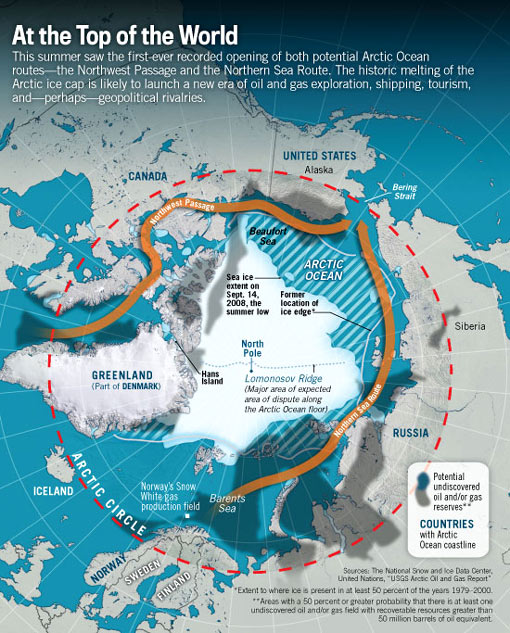
(quote)
This summer, for the first time, both the fabled Northwest Passage through the upper reaches of North America and the Northern Sea Route above Russia opened up, apart from drifting ice. Overall, the expanse of Arctic sea ice was the second smallest in the 30 years of monitoring (summer 2007 was the smallest), and that left an islandlike polar ice cap surrounded by open water. In just the past five years, summer ice has shrunk by more than 25 percent, and so has its average thickness. One consequence of this change is that much of the sun's heat formerly reflected back out to space by the ice sheets is now being absorbed, entrenching the warming process. The acceleration of the ice melt is outstripping earlier predictions of a basically ice-free Arctic summer by mid- or late century. NASA climate scientist H. Jay Zwally now anticipates that most of the Arctic will lose summer ice in only five to 10 years. "We appear to be going through a tipping point," he says.












